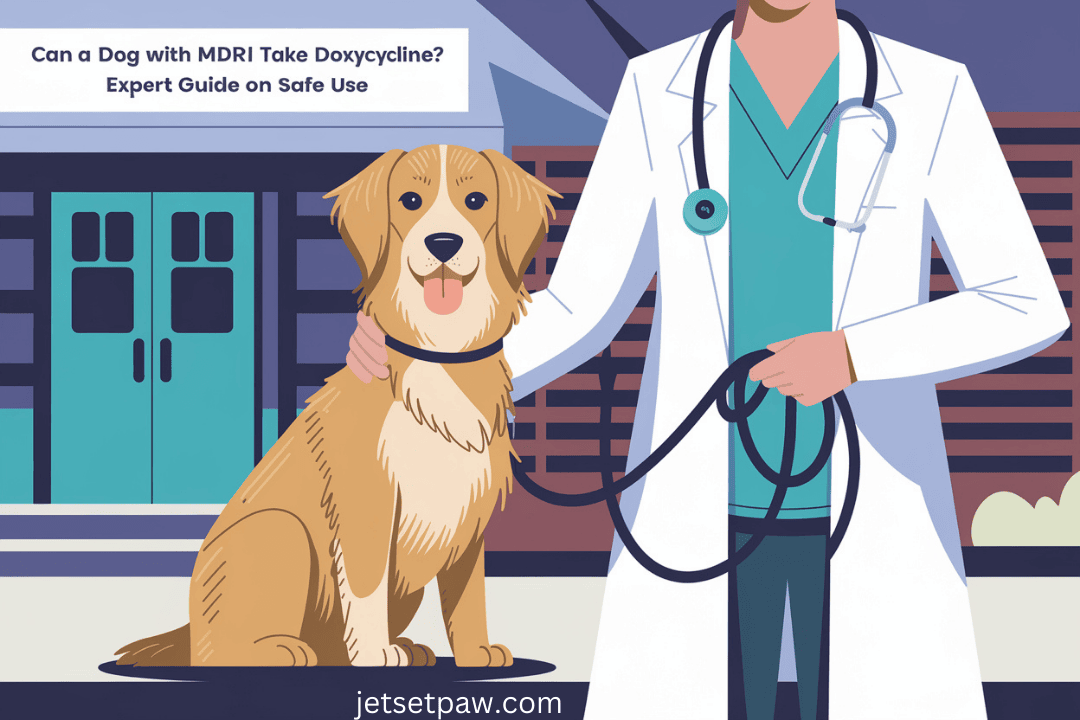Have you ever heard of MDR1 in dogs? It’s a genetic condition that makes some dogs extra sensitive to certain medicines.
MDR1 stands for Multi-Drug Resistance 1, and it’s like a unique code in a dog’s DNA that affects how their body handles some drugs. Dogs with this condition need extra care when it comes to medications.
Now, let’s talk about doxycycline. Vets often use it to treat different infections in dogs. It’s familiar and works well for many types of bacteria. You might hear about it if your dog gets sick with things like Lyme disease or kennel cough.
So, here’s the big question we’re going to explore: Can dogs with MDR1 safely take doxycycline? This is super important for dog owners to know, especially if their furry friend has the MDR1 condition.
We’ll dig into this topic and give you all the info you need to understand how these two things – MDR1 and doxycycline – work together in dogs.
Understanding MDR1 in Dogs
The MDR1 gene is like a unique instruction manual in a dog’s body. It tells the body how to make a protein that acts as a guardian, protecting the brain from harmful stuff.
When this gene usually works, it helps keep certain drugs from entering the brain and other essential body parts.
However, a mutation in the MDR1 gene can cause problems. This mutation makes dogs super sensitive to some medicines.
It’s like the security guard at the brain’s entrance falls asleep on the job, letting too much of certain drugs pass through. This can lead to serious side effects, even when the dog is given a standard dose of medication.
Some dog breeds are more likely to have this MDR1 mutation. Herding dogs are the most common, including:
- Collies (especially Rough Collies)
- Australian Shepherds
- Shetland Sheepdogs
- Old English Sheepdogs
- German Shepherds
Other breeds, like Long-haired Whippets and some mixed breeds, can also have this mutation. If you own one of these breeds, talking to your vet about testing for the MDR1 mutation is a good idea.
Knowing if your dog has this condition can help keep it safe when it needs medicine.
Doxycycline: An Overview
Doxycycline is a common antibiotic vets use to treat various infections in dogs. It’s effective against many types of bacteria, making it useful for many problems.
Vets often prescribe it for tick-borne diseases like Lyme disease, respiratory infections such as kennel cough, urinary tract infections, and some skin conditions. This versatility makes doxycycline a go-to choice for many canine health issues.
The way doxycycline works is clever. It acts like a roadblock for bacteria, stopping them from making the proteins they need to survive and multiply.
Without these proteins, the bacteria can’t grow or spread. This allows your dog’s immune system to step in and finish the infection. The medicine weakens the bacteria, and your dog’s body can swoop in to clean up the rest.
As with any medication, doxycycline can sometimes cause side effects in dogs. The most common ones include upset stomach, vomiting, diarrhea, and loss of appetite.
Some dogs might also become more sensitive to sunlight while taking this medicine. Usually, these side effects are mild and go away on their own.
However, watching your dog and telling your vet if you notice anything unusual is always essential. Your vet can help decide if the side effects are typical or if the treatment plan needs to be adjusted.
MDR1 Dogs and Doxycycline
Good news for dog owners! Doxycycline is generally considered safe for dogs with the MDR1 mutation. This is because doxycycline isn’t one of the drugs that the MDR1 gene usually affects.
So, even if your dog has this genetic condition, they can take doxycycline without any extra problems.
However, it’s still super important to be careful. Every dog is different, and some might react unexpectedly to medicines.
This is why it’s crucial to always talk to your vet before giving your dog any new medication, even if it’s usually safe for MDR1 dogs.
Your vet might suggest starting with a lower dose of doxycycline and watching your dog closely for any unusual reactions.
They also recommend doing some tests to ensure your dog’s body is handling the medicine well. Remember, it’s always better to be extra careful about your furry friend’s health!
While doxycycline is usually okay for MDR1 dogs, other medicines can be dangerous. These include some dewormers, pain medications, and other antibiotics.
That’s why it’s essential to know if your dog has the MDR1 mutation and always check with your vet before giving any new medicines.
Ultimately, the most important thing is to work closely with your vet. They know your dog’s health history and can give the best advice about using doxycycline or any other medication.
With the proper care and attention, even dogs with the MDR1 mutation can get the treatment they need to stay healthy and happy.
Administering Doxycycline to MDR1 Dogs
When giving dogs with the MDR1 mutation doxycycline, it’s crucial to work closely with your veterinarian. Even though doxycycline is generally safe for these dogs, every animal is unique and may react differently to medications.
Your vet knows your dog’s health history and can provide the best advice on using this antibiotic safely.
Dosing for MDR1 dogs is similar to that for other dogs. Still, your vet suggests starting with a lower dose and being extra careful.
They also recommend giving the medicine with food to help prevent stomach upset. It’s important to follow your vet’s instructions exactly, including how much to give and how often.
Don’t change the dose or stop providing the medicine without talking to your vet first.
Keeping a close eye on your dog while taking doxycycline is essential. Watch for any unusual symptoms, like severe vomiting, diarrhea, or loss of appetite.
Some dogs might also become more sensitive to sunlight. If you notice anything out of the ordinary, contact your vet right away.
They might want to adjust the dose or try a different treatment. Remember, it’s always better to be safe and ask your vet if you’re unsure.
Alternative Treatments
Other antibiotics can be used for dogs with the MDR1 mutation if doxycycline isn’t the best choice. Some common alternatives include amoxicillin, cephalexin, and trimethoprim-sulfa.
These antibiotics work differently from doxycycline and might be better suited for certain infections or dogs that don’t tolerate doxycycline well.
Your vet will choose the best antibiotic based on the type of infection your dog has and how your dog has responded to medications in the past.
Sometimes, alternative treatments are necessary. This might happen if your dog has severe side effects from doxycycline or the infection isn’t improving with the current treatment.
Your vet might also suggest an alternative if your dog has other health issues that make doxycycline risky.
Sometimes, they might recommend a combination of treatments, such as using a different antibiotic and supportive care like fluids or special diets. The goal is always to find the safest and most effective treatment for your dog’s situation.
Conclusion
Let’s recap what we’ve learned about doxycycline and MDR1 dogs. Doxycycline is a helpful antibiotic that can treat many infections in dogs.
It works by stopping bacteria from growing, which helps your dog’s body fight off the infection. While it’s generally safe for MDR1 dogs, it’s essential to use it carefully and watch for any side effects.
The most important thing to remember is that you should always work with your veterinarian when giving any medication to your dog, especially if they have the MDR1 mutation.
Your vet can help you determine the correct dose, watch for any problems, and decide if doxycycline is the best choice for your dog. They can also suggest other treatments if needed.
Ultimately, having a dog with the MDR1 mutation doesn’t mean they can’t use doxycycline or other medications. This means you must be more careful and work closely with your vet.
With the proper care and attention, MDR1 dogs can still get the treatment they need to stay healthy and happy.
Remember, every dog is unique, and what works best for one might not be right for another. Your vet is your best partner in keeping your furry friend healthy.

